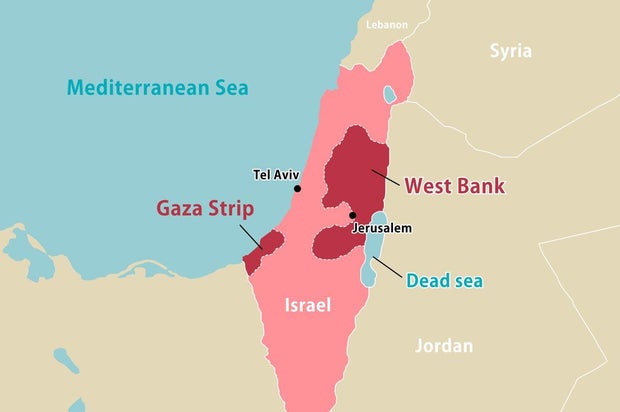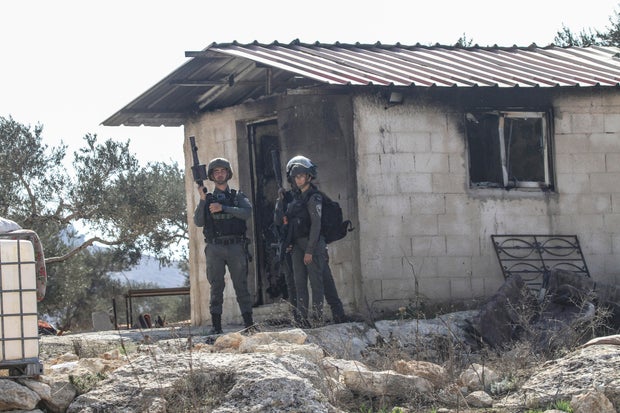In the wake of former President Donald Trump’s re-election, Israel’s far-right minister of finance suggested the country would look to annex the occupied West Bank in 2025. Here’s what you need to know:
What is the West Bank?
The West Bank is an area of land on the west bank of the Jordan River, which is part of the former British-mandated territory of Palestine. It is surrounded by Israel on three sides — the north, west, and south — and it borders the country of Jordan on its east, across the river.
After the departure of British forces in 1948 when the modern state of Israel was created, Arab forces entered and retained the West Bank, and the city of Jerusalem was divided into two sectors: the Israeli west and the Jordanian east.
During the Six-Day War in 1967, Israel occupied the West Bank and established a military administration there. Israel claimed East Jerusalem as part of its own territory, but fighting between the Israelis and the region’s Palestinian inhabitants — who live with significant restrictions on their movement and other aspects of life under the decades-long occupation — has continued.
Getty/iStockphoto
Hamas, designated a terrorist organization by the United States and Israel, decisively won a 2006 West Bank parliamentary election over the Western-backed Fatah faction, led by Mahmoud Abbas, which had been administering the Palestinian Authority. The Hamas victory brought sanctions and boycotts by the U.S., the EU and Israel of the new, Hamas-led joint Palestinian leadership.
In 2007, Abbas dissolved the Hamas-led administration in the West Bank and created an emergency cabinet that favored Fatah. The power struggle between the two Palestinian factions led to a split between the West Bank and Gaza, with Western powers supporting the Fatah-administered West Bank diplomatically and economically, while blockading the Hamas-run Gaza Strip.
How could U.S. policy change during the second Trump administration?
The longstanding position of the United States has been support for a two-state solution to the conflict between Israelis and Palestinians, meaning the creation of an independent state of Palestine alongside the independent state of Israel. Most iterations of this policy envision a future Palestinian state made up of the West Bank and East Jerusalem, as well as Gaza.
Trump’s previous administration bucked tradition, but did not flat-out reject a two-state solution. Trump moved the U.S. embassy from Tel Aviv to Jerusalem and offered a plan that would have cemented Israeli control over the entire city. It also would have protected Israeli settlements in the West Bank, which are illegal under international law, while moving toward Palestinian self-rule.
President-elect Trump’s pick to serve as the next U.S. Ambassador to Israel, former Arkansas governor and Baptist preacher Mike Huckabee, has never supported a two-state solution.
In an interview with The Associated Press when he was running to be the Republican presidential nominee in 2015, Huckabee said that, if elected, his administration would formally recognize the West Bank as part of Israel.
“I feel that we have a responsibility to respect that this is land that has historically belonged to the Jews,” Huckabee told the AP.
In a podcast interview earlier this year, Huckabee said that there “isn’t such a thing” as Palestinians, describing himself as an “unapologetic, unreformed Zionist.” He voiced similar views during his campaign in 2008.
Israel “is an extraordinary oasis in a land of totalitarianism surrounded by tyranny,” he said on the podcast earlier this year.
Florida Sen. Marco Rubio, Trump’s pick for Secretary of State, has repeatedly voiced support for the Israeli government’s response to Hamas’ brutal Oct. 7, 2023 attack.
“Although the Biden-Harris Administration has publicly backed Israel’s right to defend itself, it has also undercut Israel’s maneuverability, leading to a schizophrenic policy towards the region,” Rubio said in a letter to current Secretary of State Antony Blinken in August.
Voicing his objection to U.S. sanctions against individuals alleged to be supporting “extremist settler violence” against Palestinians in the West Bank, Rubio wrote that, “Israel has consistently sought peace with the Palestinians. It is unfortunate that the Palestinians, whether it be the Palestinian Authority or FTOs such as Hamas, have rejected such overtures. Israelis rightfully living in their historic homeland are not the impediment to peace; the Palestinians are.”
Israel’s far-right government says it’s preparing for annexation of the West Bank
Some of those who do not support the creation of an independent Palestinian state do support Israel’s annexation of the West Bank, including members of the current far-right Israeli government led by Netanyahu.
Netanyahu’s Likud party is currently part of a coalition, formed to keep Netanyahu in power, with radical right-wing nationalist parties such as the Religious Zionist Party.
Netanyahu, who has spoken out against the creation of a Palestinian state, committed to pursuing the annexation of the West Bank in Likud’s coalition agreement with the Religious Zionist Party.
“The people of Israel have a natural right to the Land of Israel,” the agreement says. “In light of the belief in the aforementioned right, the Prime Minister will lead the formulation and promotion of a policy within the framework of which sovereignty will be applied in the West Bank, while choosing the timing and considering all national and international interests of the state of Israel.”
Bezalel Smotrich, the Israeli finance minister who’s a member of the Religious Zionist Party, said he believed Israel could work with the incoming Trump administration to promote annexation of the West Bank.
“I am convinced that we will be able to work closely together with President-elect Trump and all members of the incoming administration, to promote the common values and interests of the two countries, to strengthen the strength and security of the State of Israel, to expand the circle of peace and stability in the Middle East out of strength and faith and on the basis of recognition in the unquestionable historical belonging of the whole Land of Israel to the people of Israel,” Smotrich said on social media.
Israeli settlements and smaller outposts in the West Bank are illegal under international law. They’re also seen as a barrier to a potential two-state solution, because the more Israeli Jews live in the occupied territory, the less likely it seems that Israel would ever abandon control of the land for it to become part of a Palestinian state.
A Pew Research Center survey carried out in the summer found Israelis divided on the potential security risks and benefits of continued settlement expansion, with 40% of respondents saying they help make Israel more secure and 35% saying they hurt security. The survey found 21% of Israelis didn’t believe settlement expansion would have any significant impact on security.
Some Israeli activists believe their government is taking advantage of the country’s collective grief after the Oct. 7 attack to push an agenda in the West Bank that doesn’t have broad public backing.
“In Israel, there’s very little public criticism or any sort of public debate on what is going on in the West Bank,” Sarit Michaeli, international advocacy lead for the Jerusalem-based rights group B’Tselem, told CBS News of the situation post-Oct. 7 attack. “Israelis are furious. They’re angry. They’re hurt. They’re traumatized, and this collective trauma has been exploited by our government to push forward policies that most Israelis don’t necessarily agree with in the West Bank.”
In June, the Israeli body that governs the West Bank transferred many powers over the territory from Israeli military officials to civil ones, who work under Smotrich.
Since the Oct. 7 Hamas attack, the monitoring group Peace Now says it has documented at least 43 new illegal outposts in the West Bank, mostly on farmland. Dozens of new roads have been paved to facilitate the establishment of these outposts, the group said.
What would it mean if Israel does annex the West Bank?
In 2020, Tel Aviv University’s Institute for National Security Studies (INSS) analyzed what Israeli annexation of the West Bank could actually entail. They looked at three possible scenarios, with Israel either taking full security and administrative control of a portion of the Palestinian territory, or just preventing future evacuation of existing Israeli settlements.
In all three of the scenarios examined, Israeli sovereignty would not necessarily be applied in full to Palestinians in the area. If it were to be, Palestinians would live under the jurisdiction of the State of Israel and, under Israeli law, would be entitled to request citizenship.
Nasser Ishtayeh/SOPA Images/LightRocket/Getty
The INSS said annexing West Bank territory would make it harder for future Israeli governments to give up that land as part of any deal to create a Palestinian state.
“In actuality, annexation means tying the hands of future Israeli governments that would be willing to transfer territories for a political settlement,” the INSS report said.
One senior Palestinian politician in Gaza recently told CBS News that regardless of what changes Israel ushers in under the new leadership in Washington, it would not end the Palestinian people’s decades-long fight for a state of their own.
“We will struggle for our rights,” Mustafa Barghouti, a doctor in Gaza and the leader of the Palestinian National Initiative party, told CBS News. The Palestinian National Initiative party champions a unified democratic government for both the West Bank and Gaza.
“It will take time. We will suffer. We know that. But what’s the alternative? To cease to exist? It’s ethnic cleansing. We cannot accept that,” Barghouti said.


